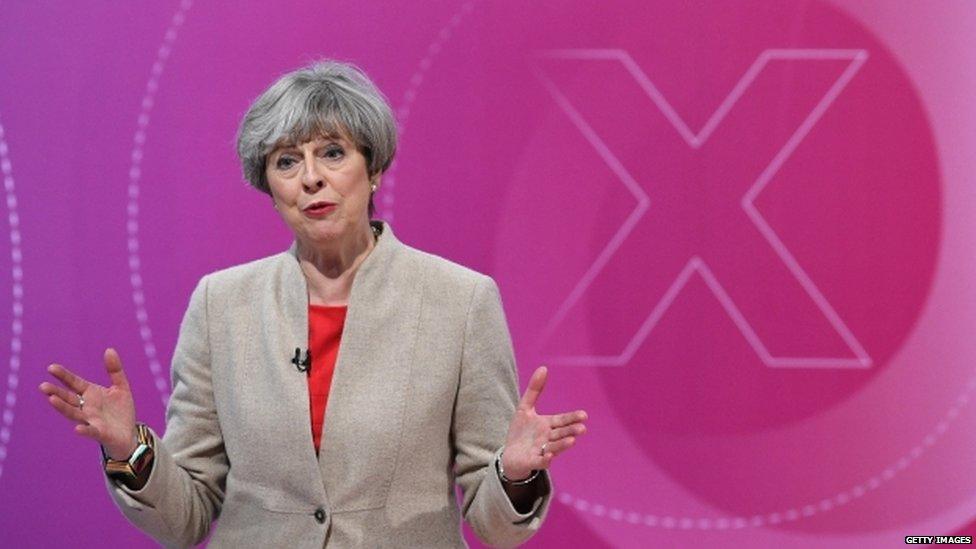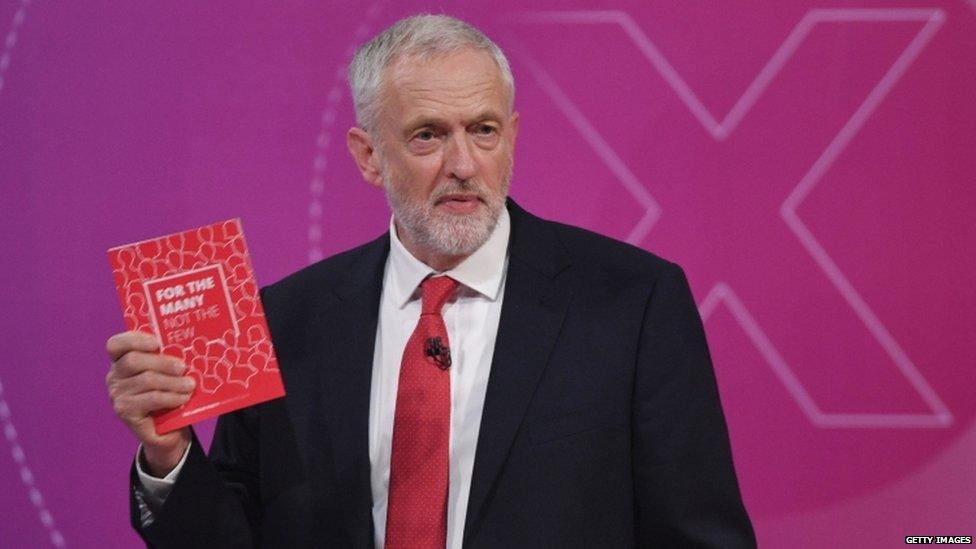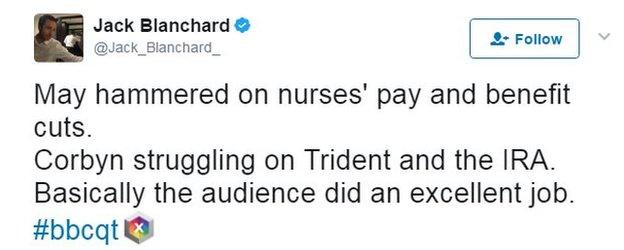Election 2017: Five key things about the Question Time special
- Published
Highlights: Watch the audience give May and Corbyn a hard time
Theresa May and Jeremy Corbyn faced a grilling from members of the public in a BBC Question Time election special. Here are five key takeaways.
1. The audience was on fire
It might not have been the head-to-head many people wanted - which Mr Corbyn said was a "shame" - but the audience didn't hold back when it came to asking difficult questions.
The tone was set from the get-go, when Mrs May was asked whether the public should trust anything she says given her "track record of broken promises and backtracking".
The tough questions kept coming. The Conservative leader got: "Secretly, do you really regret calling this election, now the polls have moved against you?" And: "do you really think you actually have any real leverage with Brussels?"
Mr Corbyn didn't get off lightly either, with the first question from the audience on why the British public should trust him to negotiate Brexit.
He was also asked to rule out a deal with the SNP, and: "Why have you never regarded the IRA as terrorists?" Mr Corbyn said he "deplored all acts of terrorism."
2. The magic money tree was back, again

Home Secretary Amber Rudd repeatedly accused Mr Corbyn of having a "magic money tree" during the seven-way debate on Wednesday, and Mrs May took up the baton, repeating the mantra on a number of occasions.
"There isn't a magic money tree that we can shake that suddenly provides for everything that people want," she said.
Mr Corbyn was later asked if his manifesto was "a letter to Santa Claus."
Waving a hard copy about, the Labour leader said it was a "serious and realistic document" that addressed the issues that many people faced.
3. Theresa May had awkward moments on the NHS
NHS workers to Theresa May: "Don't tell us we're getting a pay rise"
Mrs May came under fire from a nurse, Victoria Davey, over the 1% cap on annual public sector pay rises, asking how was it "fair" that her 2009 pay slip "reflected exactly" what she earned today. Mrs May said she recognised the job nurses did, but the Conservative Party "had had to take hard choices across the public sector".
Another woman with mental health issues was close to tears as she spoke about being asked about suicide attempts during a work capability assessment. Mrs May said she would "make no excuses" for the way she had been treated and people with mental health issues had to be given "more support at an early stage."
But BBC political correspondent Gary O'Donoghue said Mrs May seemed uneasy and was "reluctant to engage and empathise beyond a few carefully chosen words".

There was another awkward moment when an audience member asked Mrs May if mental health funding was "one of [her] soundbites" when asked about the NHS.
She accused her of failing to differentiate between mental health and learning difficulties when speaking to a woman while on the campaign trail in Oxfordshire - but Mrs May said the woman had spoken to her about both issues.
4. Jeremy Corbyn was put under pressure on nuclear weapons

The Labour leader, who's made no secret of his long-held opposition to Trident despite agreeing to press ahead with renewal of the system, was repeatedly asked whether he would be prepared to push the button if the UK was under attack.
After saying he thinks the "idea of anyone ever using a nuclear weapon anywhere in the world is utterly appalling and terrible", he ruled out authorising its "first use".
Election latest and live updates
Public hit leaders' vulnerable spots
But he declined to give a straight answer on whether he would use nuclear weapons in retaliation, with BBC anchor David Dimbleby accusing him of dodging the question.
Jeremy Corbyn was asked what he would do in the event of nuclear war
"If we did use it, millions are going to die. You have to think this thing through," Mr Corbyn said. "I would decide on the circumstances at the time," he said.
The Conservative Party press office tweeted, external: "Corbyn's answer on this Trident question is about as long as the 4 minute warning #bbcq," as some of the audience heckled, but another backed the Labour leader, saying she didn't understand why everyone in the room seemed "so keen" on killing millions of people.

5. The biggest sparks were in the spin room
Foreign Secretary Boris Johnson called Labour's national election co-ordinator Andrew Gwynne a "big girl's blouse" on Sky News shortly before the BBC debate began, apparently because Mr Gwynne wanted them to make a joint appearance.
The pair then proceeded to debate, but it wasn't long before the two men appeared to somewhat bizarrely have their arms around each other's shoulders.
They seemed to then fall forward, before Mr Gwynne said to Mr Johnson: "Don't be a pillock."
...and the winner was? The audience, according to pundits



